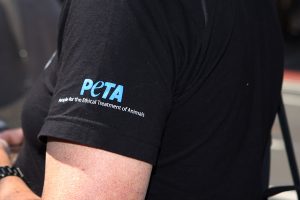Exploit.
Torture.
Murder.
Rape.
Slavery.
Abuse.
How awful are these words? How terrible are these actions? And what do these words all have in common?
These are words that vegan animal-rights activists use to describe the work of livestock farmers. Isn’t that sad?
Did you know that as a Facebook page admin, we can choose to block certain words from our page so that those comments won’t show up on the page and will be flagged as spam? It’s crazy to think that these are the words I must block to prevent harassment from animal-rights activists (although it’s quite rare I am attacked) on my page. It’s also a great tool to weed out negativity.
It drives me crazy when these activists come troll my social media pages after writing an article or doing a post in support of animal agriculture. You can read more about this here, and the hatred that so many of us in animal agriculture endure. An interesting story and example of what’s happened on social media recently is this darling video that’s gone very viral:
Sweet, right? How can a video this adorable upset anyone?
Comments from animal-rights activists, particularly on Instagram, blew my mind with misinformation and hatred towards it. How on earth? How do their minds go to a level so negative? We must remember that there’s an extremely good chance they have never been to or worked on a farm a day in their life. They’re involved with tribes that don’t speak the truth about agriculture, and this is another reason why we as farmers must continue to educate and speak out on what we actually do!
They claim these are cows that are about to go to slaughter? Not true. These are young calves are nowhere near the end of their days. In the meantime, however, these calves appear to be in a beautiful barn, very clean, and well cared for.
Comments about how their actions suggest they’re missing their moms? No, Holstein calves (and cows in general) tend to be “lickers” by nature. They’re a more friendly and curious breed and are known to not be the best mothers.
How it’s so sad that they’re in trapped conditions and this is the only interaction they get with another human or animal? Not a chance. Farmers and ranchers care very much about the health of these animals. It’s a business, right?
And that’s another disinformed vegan animal-rights activist train of thought: That farmers don’t care and only do it for profits? Well, if you want profits, you want these animals as happy and healthy as possible, because the less stressed and happy they are, the more milk and/or meat they would produce.
» Related: Viewpoint: Targeting ag youth brings out the worst in animal-rights activism
I used to sell my beef and lamb directly to consumers at my local farmers markets, and I would get questions like that sometimes: How can we raise an animal only to know that it will die and end up on our plates? But you know what? My train of thought is that everything dies. We must treat every living being with the utmost respect, regardless of its purpose. I love the cattle as much as the cat. They will both die some day. But the difference? Cattle come with recipes!
So, I’ve always found the animal-rights tactics and mindset quite disturbing, to be honest. Who looks at the video above and gives it a negative spin? Animals, people, and everything else die. Livestock give us thousands of useful byproducts and yes, they will someday be let go of just like pets and humans are. Yet, livestock producers are the devil in activists’ eyes.

Words matter too. Why is it that when it’s time for pets to die, society uses gentle phrases like “putting them to sleep” but livestock are “slaughtered?” Who even came up with these terms? The word “slaughter” just sounds awful, but is the process really awful? I would say no and that the industry is very well regulated; sometimes livestock are also “put to sleep” as a very humane way to go. Personally, when it’s time for a food animal to go, I use the phrase “they’re ready to go to market.” Market ready sounds much better than “slaughter,” right? Geesh.
I will say, however, attacks from these extreme activists happen only in rare instances. It is very important that we don’t let the distractions of a very small vocal minority affect our psyche; we must not ever let them silence us and we should remember that well over 90 percent of people are in the moveable middle and meat isn’t going anywhere anytime soon.
Still, we must never take our foot off the gas when it comes to advocacy, education, and bringing the gap overall to strengthen the message of animal agriculture and ensure the general public is comfortable with the meat supply and how livestock are raised.
Personally, I know that the more I’m involved hands-on with the livestock industry, the more comfortable I am with the process overall and confident that all animals deserve happy, healthy lives regardless of where they end up. I hope you feel the same.
Michelle Miller, the Farm Babe, is a farmer, public speaker and writer who has worked for years with row crops, beef cattle, and sheep. She believes education is key in bridging the gap between farmers and consumers.



